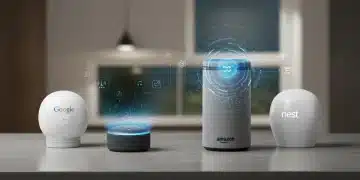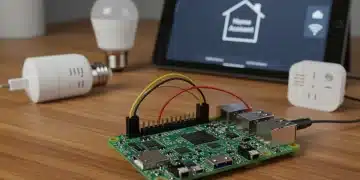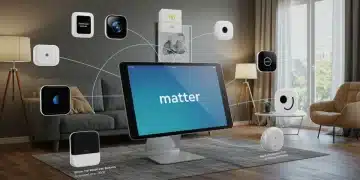Smart Home Voice Assistants: Alexa vs. Google vs. Siri
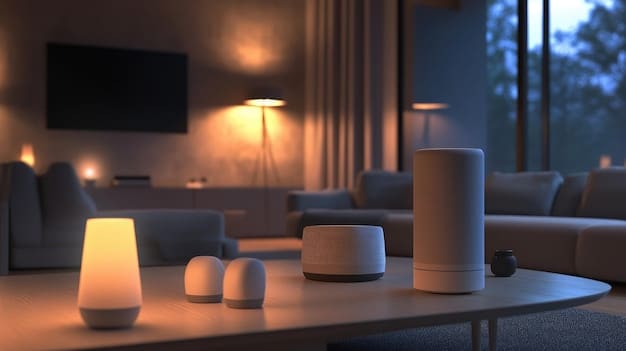
Smart home voice assistants like Alexa, Google Assistant, and Siri offer unique functionalities for home automation, and choosing the right one depends on individual needs, preferred ecosystem, and desired level of integration with other smart devices.
The rise of smart home voice assistants has transformed how we interact with our homes. Alexa, Google Assistant, and Siri are the leading contenders, each vying for a spot as the central hub of your smart home. Which one reigns supreme?
Understanding Smart Home Voice Assistants
Smart home voice assistants are software agents that use voice recognition, natural language processing, and artificial intelligence to provide services and information to users. They can control smart home devices, play music, set alarms, answer questions, and much more.
These assistants are typically activated by a wake word, like “Alexa,” “Hey Google,” or “Hey Siri,” followed by a command or question. They then process the request and respond accordingly, often through a built-in speaker.
Key Features of Voice Assistants
Voice assistants offer a range of features that make them valuable additions to any smart home. Let’s explore some of the key functionalities:
- Voice Control: The ability to control smart home devices with simple voice commands.
- Information Retrieval: Access to information on weather, news, sports scores, and more.
- Entertainment: Streaming music, podcasts, and audiobooks through voice commands.
- Task Management: Setting alarms, creating to-do lists, and managing calendars.
These features help create a more convenient and efficient living environment, allowing you to manage various aspects of your home with ease.
In conclusion, smart home voice assistants are powerful tools that offer a range of features designed to simplify and enhance your daily life. Understanding their core capabilities is the first step in choosing the right assistant for your needs.
Alexa: The Amazon Ecosystem Champion
Amazon’s Alexa has become a household name, known for its extensive smart home integration and vast library of skills. It’s closely tied to the Amazon ecosystem, making it a popular choice for Prime members and those invested in Amazon’s services.
Alexa excels at controlling a wide range of smart home devices, from lights and thermostats to door locks and security cameras. Its robust skills marketplace offers countless third-party integrations, extending its functionality even further.
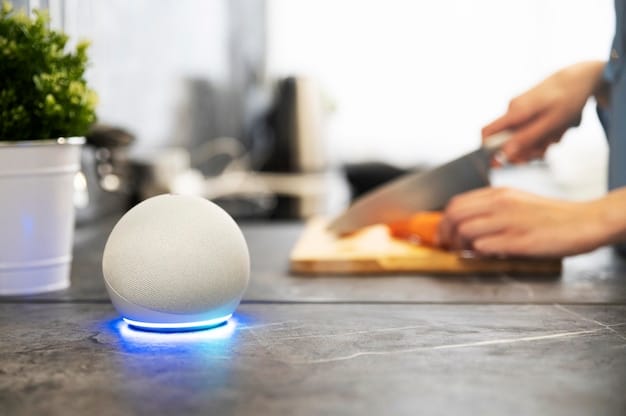
Alexa’s Strengths
What makes Alexa a standout choice for smart home automation? Here are some of its key strengths:
- Extensive Device Compatibility: Alexa works with a vast array of smart home devices from various manufacturers.
- Skills Marketplace: The skills marketplace offers a wide range of third-party integrations and custom commands.
- Seamless Amazon Integration: Alexa seamlessly integrates with other Amazon services, like Prime Music, Audible, and Amazon Shopping.
- Voice Shopping: Users can make purchases through Amazon using voice commands.
However, Alexa’s integration with other Amazon services can also be seen as a drawback for those who prefer to use alternative platforms or are concerned about data privacy.
In conclusion, Alexa is a solid choice for those heavily invested in the Amazon ecosystem and seeking broad device compatibility and extensive skills.
Google Assistant: The Knowledge Powerhouse
Google Assistant leverages Google’s vast knowledge graph and search capabilities to deliver informative and helpful responses. It’s deeply integrated with Google’s services, such as Google Search, Google Maps, and YouTube, making it a powerful tool for information retrieval and task management.
Google Assistant is available on a variety of devices, including smart speakers, smartphones, and smart displays, ensuring a consistent experience across platforms. Its natural language processing capabilities allow it to understand complex commands and provide accurate responses.
Google Assistant’s Strengths
Here’s a look at the key strengths that set Google Assistant apart from its competitors:
- Superior Knowledge: Google Assistant excels at answering questions and providing information thanks to Google’s vast knowledge graph.
- Natural Language Processing: It understands complex commands and can engage in more natural conversations.
- Cross-Device Consistency: Google Assistant provides a consistent experience across various devices.
- Tight Integration with Google Services: Seamless integration with Google Search, Google Maps, YouTube, and other Google services.
One potential concern is Google’s reliance on personal data to personalize responses, which may raise privacy concerns for some users.
In conclusion, Google Assistant is an excellent choice for those who value access to information and a seamless integration with Google’s services. Its natural language processing capabilities and cross-device consistency make it a versatile assistant for any smart home.
Siri: The Apple Ecosystem Integrator
Siri, Apple’s voice assistant, is deeply integrated into the Apple ecosystem, offering a seamless experience for iPhone, iPad, Mac, and HomePod users. It’s known for its focus on privacy and security, as well as its tight integration with Apple’s apps and services.
Siri allows users to control their Apple devices with voice commands, set reminders, send messages, make calls, and more. It also works with HomeKit, Apple’s smart home platform, enabling users to control compatible smart home devices.
Siri’s Strengths
Let’s explore the strengths that make Siri a strong contender in the smart home voice assistant market:
- Privacy Focus: Apple emphasizes privacy and security with Siri, processing data on-device whenever possible.
- Apple Ecosystem Integration: Seamless integration with Apple devices and services, like Apple Music and Apple HomeKit.
- HomeKit Compatibility: Control over compatible smart home devices through Apple’s HomeKit platform.
- Personalization: Learns user preferences and provides personalized responses.
However, Siri’s device compatibility is limited to HomeKit-enabled devices, which may be a drawback for users with devices from other ecosystems.

In conclusion, Siri is a strong choice for those deeply invested in the Apple ecosystem and prioritizing privacy. Its seamless integration with Apple devices and services makes it a convenient and secure option for controlling a smart home.
Comparing Smart Home Capabilities
When it comes to smart home capabilities, each voice assistant has its strengths and weaknesses. Alexa boasts the widest device compatibility, while Google Assistant shines with its knowledge and natural language processing. Siri excels at privacy and Apple ecosystem integration.
Consider which smart home devices you already own or plan to purchase, and choose the voice assistant that offers the best compatibility and control options. Also, think about which ecosystem you prefer, as each assistant is closely tied to its respective platform.
Considerations for choosing
Choosing might be a tricky part. Here’s what you can consider when choosing:
- Device Compatibility: Does the assistant work with your preferred smart home devices?
- Ecosystem Preference: Which ecosystem (Amazon, Google, or Apple) do you prefer?
- Privacy Concerns: How important is privacy to you?
- Information Needs: Do you value access to information and knowledge?
By considering these factors, you can narrow down your choices and select the voice assistant that best meets your individual needs and preferences.
The Future of Smart Home Voice Assistants
The smart home voice assistant market is constantly evolving, with new features and capabilities being introduced regularly. Expect to see improvements in natural language processing, enhanced personalization, and tighter integration with other smart devices and services.
AI-powered assistants are also becoming more proactive, anticipating your needs and offering assistance before you even ask. This will lead to a more seamless and intuitive smart home experience.
In conclusion, the future of smart home voice assistants is bright, with continued innovation and development on the horizon. Expect to see even more powerful and versatile assistants in the years to come, further enhancing the convenience and efficiency of our homes.
| Key Point | Brief Description |
|---|---|
| 🗣️ Voice Control | Hands-free control of smart devices and access to information. |
| 🏠 Ecosystem | Integration with Amazon, Google, or Apple services. |
| 🔒 Privacy | Differing approaches to data security and user privacy. |
| 💡 Compatibility | Varying levels of compatibility with smart home devices. |
Frequently Asked Questions
▼
A smart home voice assistant is a device or application that uses voice recognition to control smart devices, provide information, and perform tasks. Examples include Amazon Alexa, Google Assistant, and Apple Siri.
▼
Alexa, provided by Amazon, tends to have a more wide range of possibilities when it comes to controlling other smart devices. On the other hand, it really depends on what you want.
▼
Voice assistants can collect and store voice recordings, which raises privacy concerns. Each company (Amazon, Google, Apple) has different privacy policies, so it’s essential to review them.
▼
Yes, you can use multiple voice assistants, and many people find it beneficial to leverage the strengths of each platform. However, this might introduce complexity in your setup.
▼
No, most voice assistants do not require a subscription for basic functionality. However, some features or services may require a subscription like a music streaming service.
Conclusion
In conclusion, the choice between Alexa, Google Assistant, and Siri depends on your individual needs and preferences. Consider factors like device compatibility, ecosystem integration, privacy concerns, and information needs to make an informed decision.
